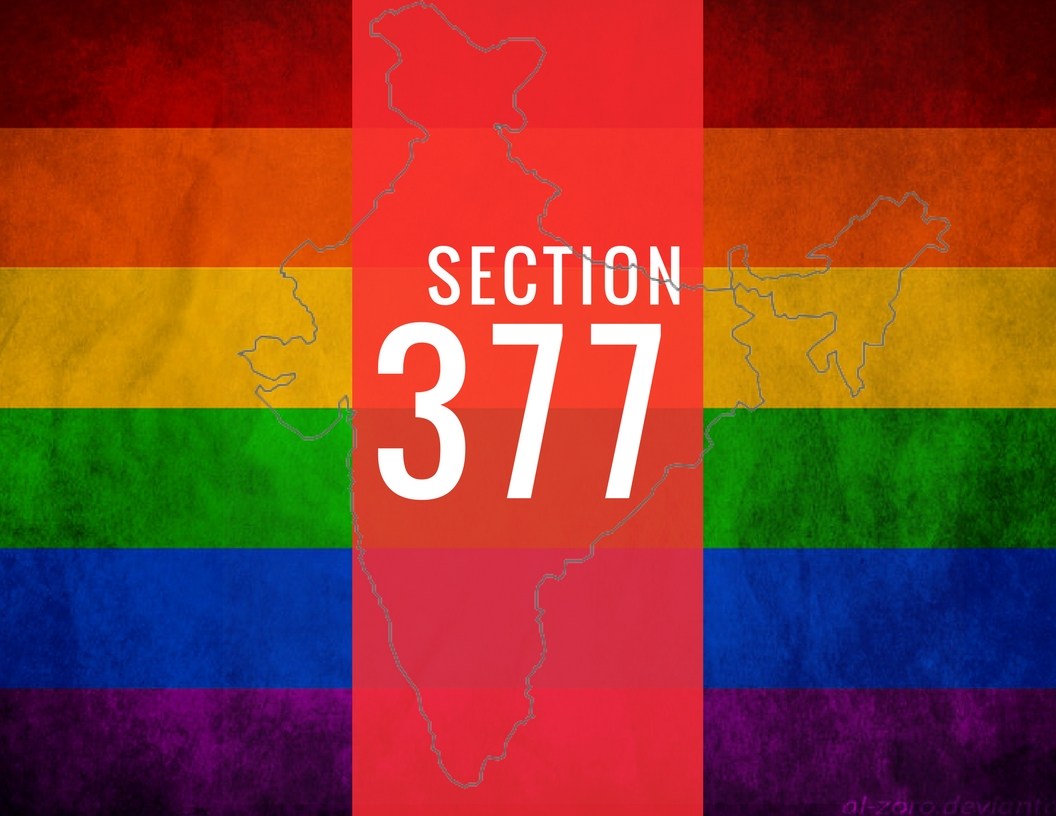In a historic decision by the Supreme Court of India, same-sex intercourse between consenting adults has been decriminalized by reading down Section 377 of the Indian Penal Code. Here’s all you need to know about it.
What was Section 377?
Section 377 of the IPC stated: “Whoever voluntarily has carnal intercourse against the order of nature with any man, woman or animal, shall be punished with 1[imprisonment for life], or with imprisonment of either description for a term which may extend to ten years, and shall also be liable to fine.”
What is the verdict?

The judgement titled ‘Navtej Singh Johar & Ors v. Union of India’ was delivered by a Constitutional bench comprising of the Chief Justice of India Dipak Mishra and Justices Rohinton Nariman, AM Khanwilkar, DY Chandrachud and Indu Malhotra. The Supreme Court has judged that criminalizing consensual and private sexual acts between adult human beings is unconstitutional and liable to be struck down. However, the Court made it clear that sexual offences like bestiality, paedophilia, necrophilia which also form a part of Section 377, will remain a criminal offence.
Thus, the Supreme Court has read down – not struck down – 377.
Note: ‘Reading down’ is where a court gives an over-inclusive statute a sufficiently narrow interpretation to bring it into line with the demands of the constitution. So, 377 still stays in the law books but now only applies to bestiality.
The timeline so far
- 1991: NGO ‘AIDS Bhedbhav Virodhi Andolan’ (ABVA) filed a petition in Delhi HC hoping to repeal Section 377 after condoms were stopped from being distributed to male inmates at Tihar jail fearing an increase in homosexuality.
- 2001: NGO ‘Naz Foundation (India) Trust’ challenged Section 377 in Delhi HC by filing a lawsuit to allow homosexual relations between consenting adults.
- 2003: High Court dismissed the case, stating that the Naz Foundation had no standing in the matter (locus standi).
- The Naz Foundation appealed this dismissal by the High Court to the Supreme Court, which concurred with them and instructed the High Court to reconsider.
- 2009: A three-judge bench passed a verdict that decriminalized consensual sexual acts between adults.
- Various appeals made to the Supreme Court, challenging the High Court’s authority to change a law.
- 2013: In the ‘Suresh Kumar Koushal vs Naz foundation’ case, a two-judge bench passed a judgment that overturned the 2009 judgment by the Delhi HC that decriminalised homosexual acts. The apex court, however, noted that Parliament should decide.
- 2014: The NALSA judgment by the SC gave the transgender community the right to be called the third gender, separate from male and female. This led to a reopening of the conversation regarding homosexuality.
- 2016: Previous petition against 377 filed by celebrated dancer N. S. Johar, journalist Sunil Mehra, chef Ritu Dalmia, hoteliers Aman Nath and Keshav Suri and business executive Ayesha Kapur is agreed to be reviewed.
- 2017: A nine-judge bench ruled that the right to privacy was a fundamental right. The judgment put Section 377 in direct opposition to the fundamental right to privacy.
- Jan 2018: Petition filed by Johar and co. sent to a five-judge bench
- Sep 2018: Supreme Court passes historic verdict ending an archaic, colonial-era law.
Summarizing the apex court’s reasons
- India’s Constitution is capable of expansion with the changing needs and demands of the society. The Courts must inculcate a progressive and pragmatic interpretation of the Constitutional ideals to fight inequality and injustice.
- Discrimination of any kind strikes at the very core of any democratic society. When guided by transformative constitutionalism, the society is discouraged from indulging in any form of discrimination so that the nation is guided towards a better future.
- The science of sexuality has theorized that an individual exerts little or no control over who he/she gets attracted to. Any discrimination on the basis of one‘s sexual orientation would entail a violation of the fundamental right of freedom of expression.
- Constitutional morality urges the Judiciary to preserve the heterogeneous nature of the society and to curb any attempt by the majority to usurp the rights and freedoms of any minority.
- The role of identity highlighted in the NALSA case connects human rights and the constitutional guarantee of the right to life and liberty with dignity. The constitutional concept of identity cannot be pigeon-holed singularly to one‘s sexual orientation.
- Autonomy is individualistic. Under the autonomy principle, the individual has sovereignty over his/her body. He/she can surrender his/her autonomy wilfully to another individual and their intimacy in privacy is a matter of their choice.
- The Supreme Court had overturned the decision of the Delhi HC in 2013, thereby upholding the constitutionality of Section 377 on the ground that the LGBT community comprised only a minuscule fraction of the total population. Such a view is constitutionally impermissible, said the court in its September 6 verdict.
- The doctrine of non-retrogression in the Constitution says there must not be going back to the previous form of constitutional rights. In the light of the same, the Suresh Koushal verdict was a retrograde step in the direction of the progressive interpretation of the Constitution.
- Other penal provisions such as Section 375 IPC and the POCSO Act already penalize non-consensual carnal intercourse. Thus, Section 377 has resulted in an unwanted effect whereby even consensual sexual acts, which are neither harmful to children nor women, by the LGBTs have been woefully targeted thereby resulting in discrimination and unequal treatment to the LGBT community and thus violating the right to equality.
For years, Section 377 IPC had subjected the LGBT community to societal pariah and dereliction. It had become a weapon for the harassment of the LGBT community by subjecting them to discrimination and unequal treatment.
Not any more.

